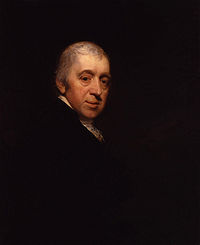Henry Phipps, 1st Earl of Mulgrave
|
General The Right Honourable The Earl of Mulgrave GCB PC |
|
|---|---|
 |
|
| Secretary of State for Foreign Affairs | |
|
In office 11 January 1805 – 7 February 1806 |
|
| Monarch | George III |
| Prime Minister | Rt. Hon. William Pitt the Younger |
| Preceded by | The Lord Harrowby |
| Succeeded by | Rt. Hon. Charles James Fox |
| Personal details | |
| Born | 14 February 1755 |
| Died | 7 April 1831 (aged 76) |
| Nationality | British |
| Political party | Tory |
| Spouse(s) | Martha Sophia Maling (d. 1849) |
General Henry Phipps, 1st Earl of Mulgrave GCB, PC (14 February 1755 - 7 April 1831), styled The Honourable Henry Phipps until 1792 and known as The Lord Mulgrave from 1792 to 1812, was a British soldier and politician. He notably served as Foreign Secretary under William Pitt the Younger from 1805 to 1806.
Lord Mulgrave was a younger son of Constantine Phipps, 1st Baron Mulgrave (also Baron Mulgrave, of New Ross), by his wife the Hon. Lepell, daughter of John Hervey, 2nd Baron Hervey, and was educated at Eton and the Middle Temple.
Lord Mulgrave entered the army in 1775, and eventually rose to the rank of General. He saw service in the Caribbean during the American Revolutionary War. In 1793 he was made Colonel of the 31st (Huntingdonshire) Regiment of Foot. Also in 1793, because he was on a mission to the King of Sardinia in Turin, he was near at hand when British forces captured the French port of Toulon, and he briefly took command of the British land forces there, before withdrawing upon the arrival of more senior officers. In 1799 he was sent out on another special military mission, this time to the headquarters of the Austrian commander, Archduke Charles, to attempt to persuade him to retain his troops in Switzerland rather than removing them to the Middle Rhine, but he was unsuccessful.
In 1784 Lord Mulgrave was elected to the House of Commons for Totnes. He supported the government of Pitt, to whom he eventually became close. In 1790, he was elected for Scarborough in Yorkshire. He succeeded his brother Constantine Phipps, 2nd Baron Mulgrave as Baron Mulgrave in the Peerage of Ireland in 1792, but did not succeed to his brother's British title. In 1794 he was granted a British peerage as Baron Mulgrave, entering the House of Lords, and in 1796 he was made Governor of Scarborough Castle. Mulgrave supported Pitt when he resigned in 1801, and in return for his loyalty was rewarded with the office of Chancellor of the Duchy of Lancaster (1804–1805) in Pitt's second government. Following an accident suffered by Lord Harrowby, Mulgrave took his place as Foreign Secretary, in which position he helped Pitt to form the Third Coalition against Napoleon.
...
Wikipedia
